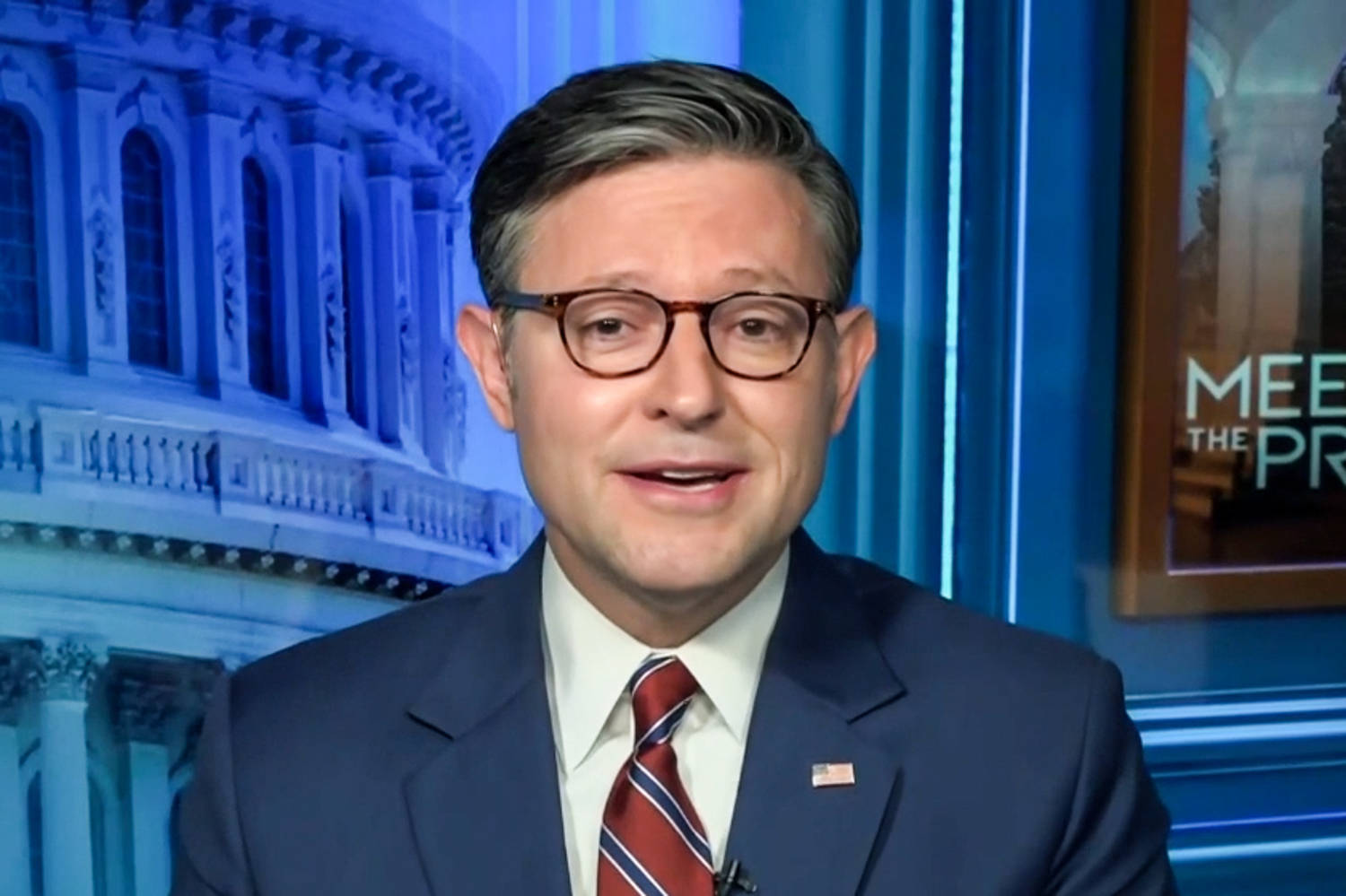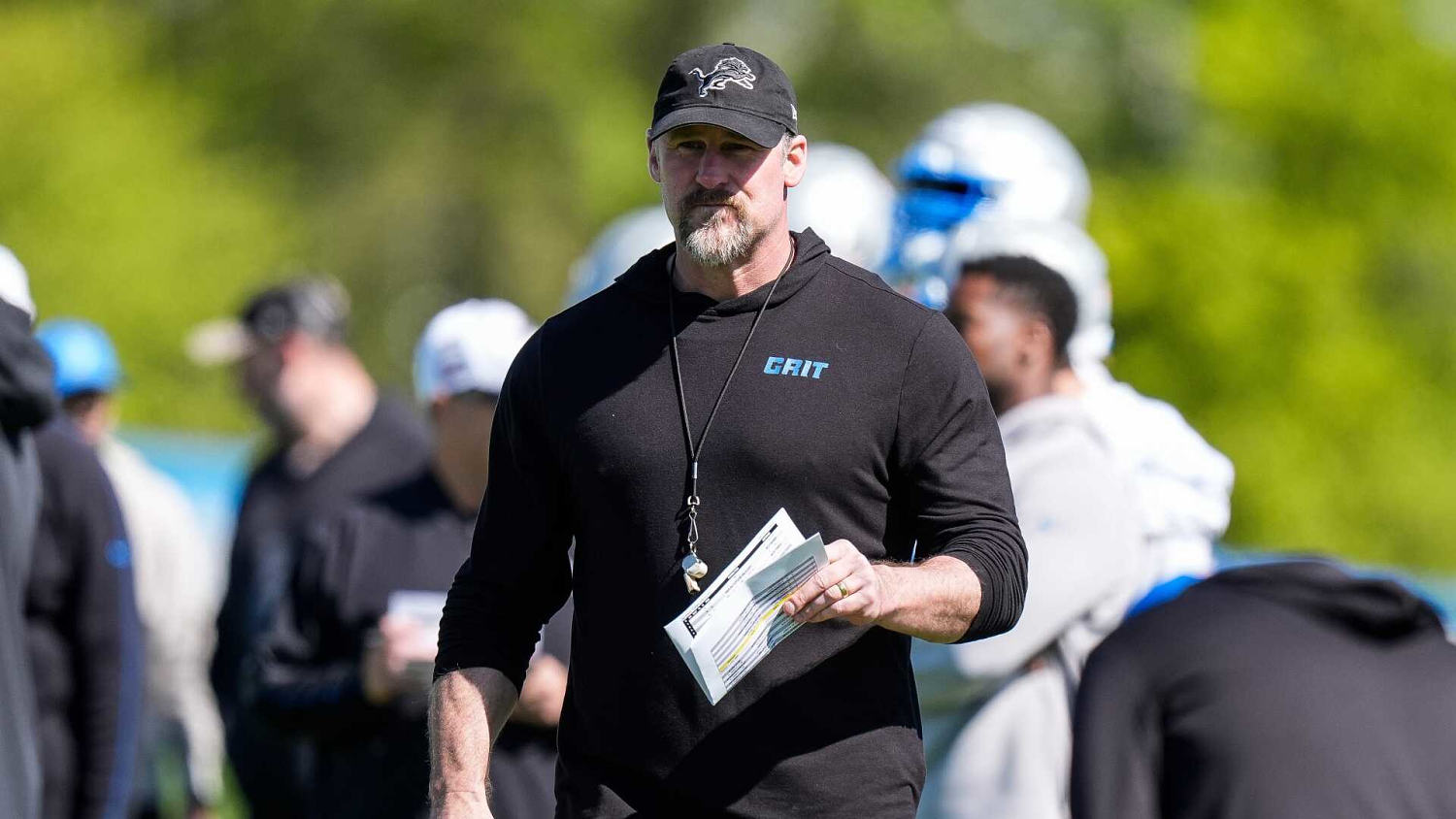KRISTEN WELKER:
This Sunday: spending fight. President Trump’s legislative agenda narrowly passes in the House and now heads to the Senate where it faces significant challenges.
SEN. JOSH HAWLEY:
I just want to make sure that there are no Medicaid benefit cuts.
SEN. RAND PAUL:
This will be the greatest increase in the debt ceiling ever. The GOP owns this now.
KRISTEN WELKER:
As concerns grow over the rising debt…
ELON MUSK:
I think a bill can be big or can be beautiful, but I don’t know if it can be both.
KRISTEN WELKER:
Can Republicans overcome their differences?
PRES. DONALD TRUMP:
We got to get that beautiful, big bill, beautiful, beautiful as it is, got to get it passed the Senate. Call your senators.
KRISTEN WELKER:
I’ll talk exclusively with Speaker of the House Mike Johnson and Democratic Senator Raphael Warnock of Georgia. Plus: tariff resistance. Uncertainty grows over President Trump’s sweeping global tariffs after federal courts question the president’s tariff authority.
PRES. DONALD TRUMP:
We’re having a lot of problems with the liberal judges in courts, the radical left, crazy judges.
PETER NAVARRO:
I can assure the American people that the Trump tariff agenda is alive, well, healthy.
KRISTEN WELKER:
And: campus crackdown. The Trump administration’s battle with Harvard escalates as it tries to block international students from enrolling.
PRES. DONALD TRUMP:
Harvard wants to fight. They want to show how smart they are, and they’re getting their ass kicked.
KRISTEN WELKER:
Joining me for insight and analysis are: NBC News Chief Justice and National Affairs Correspondent Kelly O’Donnell. Jonathan Martin of Politico. Former Homeland Security Secretary Jeh Johnson. And Lanhee Chen, a fellow at the Hoover Institution. Welcome to Sunday, it’s Meet the Press.
ANNOUNCER:
From NBC News in Washington, the longest-running show in television history, this is Meet the Press with Kristen Welker.
KRISTEN WELKER:
Good Sunday morning. President Trump’s legislative agenda — what is now formally called the “One Big Beautiful Bill” — narrowly passed the House by one single vote. It includes an extension of the 2017 tax cuts, nearly $150 billion in new defense spending, almost $150 billion for border and immigration priorities, and almost $800 billion in savings from changes and cuts to Medicaid. And now the Speaker of the House Mike Johnson is urging the Senate not to make major changes to the bill. But Senate Republicans returning to Washington this week are vowing to make significant fixes to address their concerns.
[START TAPE]
SEN. RAND PAUL:
I’ve told them, I can support the package if they separate the debt ceiling off and have a separate vote on that. I want nothing to do with that. I didn’t vote for the spending, I didn’t vote for the debt.
SEN. JOSH HAWLEY:
I just want to make sure that there are no Medicaid benefit cuts. I’m concerned about some of what the House has done on rural hospitals, essentially the hospital tax.
SEN. RON JOHNSON:
We have to reduce the deficit. And so, we need to focus on spending, spending, spending. I think we have enough to stop the process until the president gets serious about spending reduction and reducing the deficit.
[END TAPE]
KRISTEN WELKER:
Now, any delays in the president’s bill making its way through Congress comes with serious risks to the economy. The Treasury secretary has warned Congress it must extend the debt ceiling to avert a default before August. But as Republicans sort out their differences, some House members who voted in favor of the bill got an earful of boos and jeers when they returned to their home districts.
[BEGIN TAPE]
REP. MIKE FLOOD: I voted for that bill. I voted for that bill.
CROWD: Boo.
REP. ASHLEY HINSON: I was also proud to vote for President Trump’s one big, beautiful bill last week.
CROWD: Boo.
REP. ASHLEY HINSON: This is a generational investment – this is a general investment. This is your time.
[END TAPE]
KRISTEN WELKER:
Republican Senator Joni Ernst defended the bill’s proposed changes to Medicaid when pressed by a constituent who worried it would lead to deaths.
SEN. JONI ERNST:
We – people are not – well, we all are going to die. So, for heaven’s sakes, for heaven’s sakes, folks, okay, no, but – well, what you don’t want to do is listen to me when I say that we are going to focus on those that are most vulnerable
KRISTEN WELKER:
And joining me now is the Speaker of the House, Mike Johnson of Louisiana. Speaker Johnson, welcome back to Meet the Press.
SPEAKER MIKE JOHNSON:
Hey, great to be with you as always.
KRISTEN WELKER:
It is great to have you back. Let’s start right there, talking about what is now officially called the One Big Beautiful Bill Act. Here’s what Elon Musk had to say about it. Take a listen.
[START TAPE]
ELON MUSK:
I was, like, disappointed to see the massive spending bill, which increases the budget deficit, not just decrease it, and undermines the work that the DOGE team is doing.
[END TAPE]
KRISTEN WELKER:
And Mr. Speaker, a number of Senate Republicans share Elon Musk’s concerns that it will add to the debt and deficit. So how do you convince your Republican Senate colleagues to get on board and support this bill?
SPEAKER MIKE JOHNSON:
Well, I convince my friends and colleagues by use of the facts. I sent a long text message to my good friend, Elon Musk, after he made those comments the other day to explain this is not a spending bill. This is a reconciliation package. It is reconciling a budget. So there is some additional spending, as you noted earlier at the opening, for national security, for historic investments in border security, the largest in generations, because those are necessary expenditures. But what my friends are missing is the tremendous and historic level of spending cuts that are also in the same package. So, a lot of the analysis that people are pointing to is from groups, for example, like the Congressional Budget Office, the CBO. They have projected anemic economic growth. They’re assuming a growth level of 1.8% over the next ten years. Kristen, never in U.S. history has the U.S. economy sustained less than 2% economic growth over a ten-year period. What’s going to happen here is exactly the opposite. We’re going to have historic growth because we’re basing this on the history of the recent past. Remember, in the first Trump administration the 2017 Tax Cuts and Jobs Act, the CBO was off in its estimates of that one by $1.5 trillion, okay, because they underestimated the incredible growth that would be brought about. This is going to be jet fuel. The reason we call it the “big, beautiful bill” is because it is a tremendous pro-growth package entwined in this legislation that is going to make everybody’s incomes go up. There’s going to be more job opportunity, more opportunity to climb up that economic ladder in America. Because job creators, entrepreneurs, and risk-takers will have the government off their backs. They will have lower taxes and they will be expanding their businesses. We’re incentivizing U.S. manufacturing again. We’re bringing jobs back to the U.S. That’s going to help everybody – all boats rise, like we did in 2017, except this time it’s on steroids.
KRISTEN WELKER:
Well, it is worth noting that some budget experts say that in 2017 actually the CBO was pretty right when you adjusted for inflation. But let me read you something that you said back in 2021 about the CBO. This was in relation to a Democratic bill. You said, “The CBO has confirmed this bill adds nearly $400 billion to the deficit, contrary to the White House’s claim that the bill is paid for.” So do you only believe the CBO when a Democrat is president, Mr. Speaker?
SPEAKER MIKE JOHNSON:
No. This is very easy to explain. The CBO sometimes gets projections correct. But they’re always off, every single time, when they project economic growth. They always underestimate the growth that will be brought about by tax cuts in reduction and regulations. Look, when we did this in 2017, the first two years of the Trump administration, we literally brought about the greatest economy in the history of the world, not just the U.S. because we got the government off the backs of the people who create the jobs, and we’ve allowed hardworking Americans to have more money in their pocket that they could take home. We’re doing that again. Remember, in this Big Beautiful Bill, the reason we call it that is because there’s benefits for everybody. It’s geared for hard-working Americans, lower and middle income Americans. No tax on tips, no tax on overtime. No tax on interest on car loans, if you buy products made in the U.S.A. We’re going to give relief to seniors on Social Security. There’s so many benefits and features in this bill, and it’s going to allow everybody to do better. And at the same time, projecting and ensuring the largest amount of savings literally in history. There’s no government on planet Earth that’s ever saved over $1.6 trillion in a piece of legislation. This one does. And so when you reduce government spending, and you allow people to keep more of their hard-earned money, the economy grows. And that’s exactly what’s going to happen here.
KRISTEN WELKER:
Well, the Joint Committee on Taxation is projecting just three-hundredths of a percent on growth. But let me just ask you, I want you to address the concerns of your colleagues – Senator Ron Johnson, Senator Rand Paul. Why doesn’t this bill do more to address the debt and deficit, Mr. Speaker?
SPEAKER MIKE JOHNSON:
Yeah. Well, listen, I agree with my good friend, Ron Johnson, for example. A lot of the comments that he’s stated about government spending. We have a north of $36 trillion federal debt right now, and it is the largest national security concern for the U.S. I am a fiscal hawk. Many of my Republican colleagues in the House feel the same way. But it did not – we didn’t get in this situation overnight, Kristen. It took us decades, many decades of Congress’s, frankly, mismanagement of the public fisc to get in this situation. And the last four years of the Biden administration increased spending dramatically. So, it’s going to take us a while to get out of it. We can’t flip a magic switch and reverse it overnight. But, this is the largest step forward in the right direction the Congress has ever made. I liken this to an aircraft carrier. You don’t turn an aircraft carrier on a dime. It takes a mile of open ocean. This is the biggest turn in that wheel that we would’ve had in generations. And this is the first of a number of steps. This is a key point. This is not the only reconciliation bill. We’re going to have a second budget reconciliation bill that follows after this, and we’re beginning next week the appropriations process, which is the spending bills for government. And you’re going to see a lot of the DOGE cuts and a lot of this new fiscal restraint reflected in what Congress does next. So stay tuned, this is not the end-all, be-all. I tell my friends, my fellow fiscal hawks, we’ve got to get our fiscal house in order, and this is an incredibly and historic first start.
KRISTEN WELKER:
Mr. Speaker, if the Big Beautiful Bill does add to the debt, will President Trump own that?
SPEAKER MIKE JOHNSON:
It’s – it’s not going to add to the debt. But, I can tell you that President Trump is laser-focused on two primary things: delivering on his campaign promises and the America First agenda. Which is what a record number of, you know, 77 million voters, popular votes, requested and demanded and gave us a mandate to do. But, he’s also concerned, as I am, as Ron Johnson is, as Rand Paul is, as all of us are, about the nation’s debt. And he and I talk about this frequently. And he is excited about changing that trajectory. President Trump, I think, could be the most consequential president of the modern era because he has these opportunities to do these big things. The One Big Beautiful Bill is a big first step to provide relief for the American people, to give everybody more take-home pay, more money in their pocket, and to change the trajectory of the country. And again, it’s the first of a number of steps. And President Trump is committed to doing this.
KRISTEN WELKER:
Mr. Speaker, the Joint Committee on Taxation, the Committee for a Responsible Federal Budget, the Tax Foundation, the Penn Wharton Budget Model all say this will add trillions of dollars to the deficit. Are you really telling the American people this will not add one penny to the debt and deficit? You can guarantee that?
SPEAKER MIKE JOHNSON:
I – I am telling you, this is going to reduce the deficit. I mean, you cite some of these figures. Do you know what their economic growth projections are? The Committee for a Responsible Budgeting, they’re not even – I don’t think they’re assuming any economic growth. I mean, that’s not realistic. A lot of these groups use what they call static scoring and not dynamic scoring. Dynamic scoring, in layman’s terms, is reality. That we are going to spur on tremendous economic growth here. And so you’re going to have a higher job participation number in the economy. You’re going to have higher wages. You’re going to have more jobs provided. And in addition to that, the president’s extraordinary policies are producing great things for the country. The tariff policy that was so controversial in the beginning is having an extraordinary effect on the U.S. economy. It’s going to bring more jobs and billions of dollars in investment – trillions of dollars of investment back to the U.S. All these things are working in tandem. And I’m telling you, just wait, we’ll have plenty of time for this to all shake out before the next election cycle, the mid-year for Congress. And everyone will see, they’re going to be doing a lot better before that election.
KRISTEN WELKER:
All right, let’s move on to Medicaid now. As you know, that’s a big part of the debate as well. Here’s what the American Hospital Association is warning. It writes, quote, “The sheer magnitude of the level of reductions to the Medicaid program alone will impact all parties. Hospitals, especially in rural and underserved areas, will be forced to make difficult decisions about whether they will have to reduce services, reduce staff, and potentially consider closing their doors.” Republican Senator Josh Hawley of Missouri calling this a “hospital tax,” Mr. Speaker. So does the House bill put rural hospitals, and frankly, the most vulnerable Americans at risk?
SPEAKER MIKE JOHNSON:
No, and you can underscore what I’m about to tell you. There are no Medicaid cuts in the Big Beautiful Bill. We’re not cutting Medicaid. What we’re doing is strengthening the program. We’re reducing fraud, waste and abuse that is rampant in Medicaid to ensure that that program is essential for so many people, ensure that it’s available for the most vulnerable. It’s intended for young, you know, single pregnant women, and the disabled, and the elderly. But what’s happening right now is you have a lot of people, for example, young men, able-bodied workers, who are on Medicaid. They’re not working when they can. That drains resources from the people that need it most. And so what we’re doing here is an important, and frankly, heroic thing to preserve the program so that it doesn’t become insolvent. This is not going to hurt rural hospitals. There’s a lot of flexibility built into this. They keep saying that, you know, 7.6 million people is the figure that is supposedly going to be affected by this. But when you look at those numbers and you break them down, this is high on public opinion polling. You’re talking about 1.4 million illegal aliens that are receiving Medicaid right now. They’re not entitled to that. This is for U.S. citizens in those vulnerable populations. There’s about 4.8 million people that they’re referring to that are able-bodied workers. If you are able to work and you’re not, and you are riding on the public wagon, you need to help pull it. And by the way, Kristen, this is no draconian requirement. All we’re requiring in the legislation is 20 hours a week. You can volunteer in your community, you can be in a job training program, or you can get to work. And this is my message to young men around the country who are taking advantage of the system. It is abusing the system. We’re going to fix that. And I’m telling you, that is a very popular thing among the American people because it comports with common sense.
KRISTEN WELKER:
Well, let’s talk about that 4.8 million number. That is a CBO number, by the way, which estimates how many people would lose Medicaid if this bill were to go into law. The CBA, CBO –
SPEAKER MIKE JOHNSON:
No, no, wait, wait. Hold on —
KRISTEN WELKER:
Hold on, hold on.
SPEAKER MIKE JOHNSON:
Kristen, they don’t —
KRISTEN WELKER:
Let me make my point, and then I’ll let you make your point. I think it’s important to point out, the CBO is not saying specifically those 4.8 million are engaging in fraud. They say many will lose coverage because of paperwork, red tape, or failing and falling short of the new rules. So just let me ask you directly, do you have any actual proof that these people are engaging in fraud? Millions of Americans, as you say.
SPEAKER MIKE JOHNSON:
This is a very important distinction. Those 4.8 million people will not lose their Medicaid unless they choose to do so. I will go into any town hall in any district in America and explain what this is, and every single person will nod their heads and go, “Oh, that makes sense.” You’re telling me that you’re going to require the able-bodied, these young men, for example, okay, to only work or volunteer in their community for 20 hours a week, and that’s too cumbersome for them? I’m not buying it. The American people are not buying it. This is a new requirement. It should’ve been put in a long time ago. And the people who are complaining that these people are going to lose their coverage because they can’t fulfill their paperwork, this is minor enforcement of this policy, and it follows common sense. When people work, when able-bodied young men work, it’s good for them, for their dignity, their purpose. And it’s good for the community they’re in. If you can’t find a job, then volunteer in your community for 20 hours and you will meet the requirement. That is a basic, minimal standard.
KRISTEN WELKER:
Very quickly, because we’re almost out of time. Mr. Speaker, do you have any actual evidence that these people that you refer to are engaging in fraud?
SPEAKER MIKE JOHNSON:
There is a tremendous amount of fraud in Medicaid. It’s undisputed. Tens of billions of dollars every year are lost in fraud to Medicaid. So there’s another category of people, 1.2 million, that are totally ineligible to be on the program. We also have evidence of people who are listed and enrolled in multiple programs in multiple states simultaneously, and they are cheating the system. I’m going to say this very clearly: our legislation preserves Medicaid, strengthens Medicaid for the people who actually need it and deserve it. And we’re going to get rid of the fraud, waste and abuse, and that is a long time overdue.
KRISTEN WELKER:
And some of what you are referring to, refers to improper paperwork. But let’s move on because one of the other big issues in the Big Beautiful Bill is taxes. President Trump had actually at one point raised the idea of letting the tax rate on the wealthiest people go back to that 2017 rate. The House bill, though, does make the lower rate permanent. So Mr. Speaker, why do millionaires need to keep that tax cut?
SPEAKER MIKE JOHNSON:
That’s a Democrat talking point. This is not giving tax cuts to millionaires, it’s the opposite. The people in the tax bracket that you’re referring to, many of them are small business owners. They are the people that provide the jobs in every community in America. They use pass-through taxation, and we don’t get in the weeds, we don’t have time to get in the complications of it. We are the party that reduces taxes for all Americans. And I’m telling you, the One Big Beautiful Bill is geared for hard-working Americans. The biggest beneficiaries of this will be low and middle income Americans. That’s what we did in the Tax Cuts and Jobs Act, that’s what we’ll do again by extending those tax cuts in perpetuity, and making them permanent. That was a major promise of the president on the campaign trail. It’s a major promise of ours, and we are going to fulfill it. The Republican Party is doing right by the American people, and they’re going to feel the effects of that soon.
KRISTEN WELKER:
And Mr. Speaker, just to be clear, I mean, this is not a Democratic talking point. I’m asking you about something that President Trump himself had floated the idea of. It is estimated that if the bill becomes law the top 10% of households would see an increase in resources, but the bottom 10% would see a decrease in resources. Why are you comfortable with that?
SPEAKER MIKE JOHNSON:
No, that’s not – no, that’s simply not – I’m not comfortable with that. It is not true. Look at the actual facts of the tax cuts that we’re extending. The Tax Cuts and Jobs Act, again, from 2017, the people that benefited most from that were the lowest income Americans. It was households that made between $20,000, $30,000 a year annually. They had the biggest benefit from the TCJA. Also, the people that make $40,000 or less had their best tax benefits in over 40 years. Go back and look at the statistics. So, what we’re doing right now is by making all those tax cuts permanent, we’re preventing the largest tax increase in U.S. history. Kristen, if we don’t get this bill passed, every American is going to receive the largest tax increase in the history of our country at the end of this year when the TCJA expires. Don’t forget that. We have to extend it, and this is the vehicle to do it.
KRISTEN WELKER:
Bottom line, Mr. Speaker. You all had set a July 4th deadline to get all of this passed. Are you confident you can meet that July 4th deadline?
SPEAKER MIKE JOHNSON:
Yeah, they’ve always discounted us. I mean, I said I would do it out of the House before Memorial Day, and I was laughed at when I said that back early part of the year. But we beat it by four days, okay? We’re going to get this done, the sooner the better. Because all these extraordinary benefits that we’re talking about have to happen as soon as possible. And I’m convinced that the Senate will do it, do the right thing, send it back to us. We’re going to get it to the president’s desk, and he’s going to have a – we’re all going to have a glorious celebration on Independence Day, by July 4th when he gets this signed into law.
KRISTEN WELKER:
All right. Well, we’re going to be tracking it very closely. Speaker Mike Johnson, thank you so much for being here to talk about it. Really appreciate it.
SPEAKER MIKE JOHNSON:
Great to be with you. Thanks, Kristen.
KRISTEN WELKER:
Great to have you. When we come back, Democratic Senator Raphael Warnock of Georgia joins me next.
KRISTEN WELKER:
Welcome back. And joining me now is Democratic Senator Raphael Warnock of Georgia. He’s the author of a new children’s book, We’re in This Together: Leo’s Lunch Box, a story about sharing. Senator Warnock, welcome back to Meet The Press.
SEN. RAPHAEL WARNOCK:
Good morning. Great to be here with you on my way to church.
KRISTEN WELKER:
Well, thank you for stopping by. I know church is the highest priority. But thank you for making us a priority as well. We appreciate it. Let’s start right off where I was talking with the speaker. One of the big issues in what is now officially called the “Big Beautiful Bill Act” is, of course, Medicaid. And he makes the argument people should have to work in order to get Medicaid benefits. What’s wrong with that argument? Why shouldn’t people have to go to work in order to get Medicaid?
SEN. RAPHAEL WARNOCK:
Good morning again to you and your audience. Listen, I am a big advocate for work. I have a fierce work ethic. It was something passed on to me by my late father who was a preacher and a junk man. And every day, you know, he was picking up old junk cars to feed our family. And on Sunday morning, the man who picked up cars that had been thrown away, picked up people who had been thrown away. And this is what this legislation does, that they’re to trying to do. They’re going to throw poor people away. I believe in work. And I recently released a study in Georgia that shows that this work reporting requirement, because that’s what we’re talking about, not work requirements, work reporting requirements is very good at kicking people off of their health care. It’s not good at incentivizing work at all. There’s something wrong-headed about this kind of view of poor people, of working class people, that somehow they don’t want to go to work. We have seen this failed experiment in Georgia. We’ve got over a half million people in Georgia who are in the health care coverage gap. They are largely the working poor. The governor has put a program in place. He calls it Prosperity to Coverage, or Pathways to Coverage. He ought to call it pathways or blockages to coverage. Because they’ve only enrolled about 7,000 people. That’s pathetic. And the data clearly shows that if you want to get people to work, the way to do that is to provide them just basic health care so that they don’t get sick. And what they’re trying to do now is take this terrible experiment in Georgia, force it on the whole nation. And what we will see as a result of that is a workforce that is sicker and poorer and an economy that’s weaker.
KRISTEN WELKER:
And we should note actually that Georgia is the only state right now with work requirements. I want to move on to another aspect of this bill. The bill allocates nearly $150 billion towards border security and immigration. Under the second Trump administration, border crossings are at some of their lowest levels ever recorded. Given that most voters, Senator, say that this is a top issue, do you support the measures in this bill that would strengthen the border and border security?
SEN. RAPHAEL WARNOCK:
Listen, I support strong borders. And we don’t want to see people who are criminals, who are committing awful acts, allowed into our country. But what we need is common sense immigration laws in our country. What we are witnessing right now here in the State of Georgia, for example, a young college student who was doing well, has been here most of her life. She was accidentally picked up in a traffic stop. As it turns out, the police had it all wrong. They had the wrong person. But because of these Draconian movements that we’re seeing, this kind of singling out and “othering” people, this college student found herself in the grips of ICE. And now she’s trying to navigate her way through the system. I don’t believe that the people who voted for me and the people who voted for Donald Trump intended for this young woman, who is a bright young woman already contributing to our society, to be caught up in the clutches of our immigration system. This is the politics of fear and division and distraction. And it’s because they know that their agenda, their economic agenda is not working.
KRISTEN WELKER:
And just yes or no: do you support the provisions that would strengthen border security? Or are you a no on this entire bill? Just yes or no —
SEN. RAPHAEL WARNOCK:
Listen, I supported a bipartisan bill last year that would have strengthened our border. It was largely a bill focused on giving our border patrol the things that they needed. And the Republicans decided to kill it in order to put Donald Trump in office.
KRISTEN WELKER:
All right. Let me talk to you now about the state of the Democratic Party. As you know there’s been a lot of focus on former President Biden, the state of his health in the waning days of the campaign. I want to read you a statement from one of former Vice President Kamala Harris’s senior campaign advisors, David Plouffe. This is from the new book “Original Sin” which takes a look at Biden’s 2024 campaign. Plouffe says, “If Biden had decided in 2023 to drop out, we would have had a robust primary. Whitmer, Pritzker, Newsom, Buttigieg, Harris, and Klobuchar would have run. “Warnock and Shapiro would have kicked the tires. Maybe Mark Cuban or a business person of some sort. Twenty percent of governors and thirty percent of senators would have thought about it. We would have been eminently stronger.” You were name-checked there, Senator. So I have to give you a chance to respond. Would the Democratic Party have been stronger had President Biden dropped out of the racer or not run at all?
SEN. RAPHAEL WARNOCK:
Kristen, here is what we absolutely know about last year’s election. It’s over. And I’m going to spend all of my energy focused on the task in front of us. We are headed into a very critical week. The Republicans are trying to push forward this big ugly bill that’s going to literally cut as many as 7 million Americans off of their health care. It is a drag not only on their health care, it’s a drag on the American economy. They want to cut some $290 billion out of SNAP. This is an unfunded mandate at a time when Donald Trump’s tariff tax is literally raising the cost of groceries. And so I’ve got my sleeves rolled up and in front of me is the American people, the people of Georgia. I’m doing everything I can to save them from Trump’s big ugly bill.
KRISTEN WELKER:
All right. I didn’t hear a direct answer to the question there. But we do need to keep moving because we’ve got–
SEN. RAPHAEL WARNOCK:
Well, I take very seriously my job. The people of Georgia hired me to stand up for them. And this really is a critical week.
KRISTEN WELKER:
Ya.
SEN. RAPHAEL WARNOCK:
This big ugly bill is going to strip people of their health care. It’s going to rob working class people of the resources that they need. They’re literally trying to take health care from children. Here’s a proposal.
KRISTEN WELKER:
Sen–
SEN. RAPHAEL WARNOCK:
How about allow the tax cuts to expire for people making over $500,000 a year? If they did that, they wouldn’t have to have these Draconian SNAP cuts and cuts on health care.
KRISTEN WELKER:
All right, let’s talk about right now Maryland Governor Wes Moore speaking to South Carolina Democrats at a fundraiser on Friday. He gave this call to action to the party. Take a look.
[START TAPE]
GOVERNOR WES MOORE:
Let’s be clear. We can and we must condemn Donald Trump’s reckless actions. But we will be foolish not to learn from his impatience. If he can do so much bad in such a small amount of time, why can’t we do such good? Now is the time for us to be impatient too.
[END TAPE]
KRISTEN WELKER:
Senator, is Governor Moore right that Democrats need to take a lesson from Donald Trump and show more urgency?
SEN. RAPHAEL WARNOCK:
Listen, I’ll take my lessons from Martin Luther King Jr., who said ‘that the time is always right to do what’s right’, who talked about the fierce urgency of now. And that’s why I’m laser-focused on doing everything I can for the people of my state, particularly children. You’re looking at somebody who grew up in public housing, the 11th of 12 children. But through good government programs, Pell Grants and low interest student loans, because of Head Start which the Republicans want to cut, you’re looking at someone who’s the first college graduate in his family, the 11th of 12 children who’s now a United States Senator. I’ll tell you what keeps me up at night. It’d be harder for me to do right now what I did as that 17-year-old kid all those years ago. That is an indictment on this moment. That’s an indictment on our leadership. And what the Republicans want to do this week will take us further back in the wrong direction, which is why I’m going to do everything I can, not only to save us from this awful bill, but to put forward programs like workforce development programs so that our children can find that their wings for their dreams. I want to do everything that I can for working class people.
KRISTEN WELKER:
Senator Raphael Warnock, thank you for stopping by on your way to church. We really appreciate it.
SEN. RAPHAEL WARNOCK:
God bless you. Keep the faith.
KRISTEN WELKER:
And you. Thank you, Senator. When we come back, President Trump lashes out at the courts for blocking his agenda. His frustration boiling over at some of his own judicial appointments. The panel is next.
ANNOUNCER: To learn more about the books featured on Meet the Press. Go to NBCNews.com/books. You’ll also find new releases on history, biography, and more. NBC News receives a commission for sales made through our website.
KRISTEN WELKER:
Welcome back. The panel is here. NBC News Chief Justice and National Affairs Correspondent Kelly O’Donnell, Jonathan Martin, politics bureau chief and senior political columnist at POLITICO, former Secretary of Homeland Security Jeh Johnson, and Lanhee Chen, a fellow at the Hoover Institution at Stanford University. Thanks to all of you for being here. Kelly, the first time I’ve gotten to announce your new role.
KELLY O’DONNELL:
Thank you so much.
KRISTEN WELKER:
Congratulations.
JONATHAN MARTIN:
Here, here.
KRISTEN WELKER:
Yes. You have worn many hats here at NBC. And one of them is that you’ve covered the Congress as well. Here we are watching the evolution of what is now called the “Big Beautiful Bill Act.” Speaker Johnson saying to his Senate Republican colleagues, “Please don’t make a lot of changes.” Is that realistic? What are you watching for at this point?
KELLY O’DONNELL:
Well, it’s more than 1,000 pages. And senators will want to put their imprint on it. And Republican senators, a few, are already publicly against this. Josh Hawley of Missouri says, “It is morally wrong and politically suicidal to cut Medicaid.” His state, Missouri, more than 20% of his constituents are using Medicaid and other programs that are vulnerable in this bill. So you get where he’s coming from. They will want to debate this, its issues of deficits and its issues of programs. And they know they will have to run on this. And so they’ll be held accountable.
KRISTEN WELKER:
Jonathan, Kelly lays out the complications so well. And the complications are around messaging. Senator Joni Ernst in that town hall –
JONATHAN MARTIN:
Yeah.
KRISTEN WELKER:
– that extraordinary moment where she’s asked by one of her constituents, “Will people die because of this, because of all the changes to Medicaid?” And she says, “We all die.” I mean, politically, it’s somewhat problematic.
JONATHAN MARTIN:
Yeah. Two things from that moment, one macro, one micro. The macro being that this is the culture now of – of our politics in which you commit a gaffe like that. In a previous era, you would walk it back or just hope it would go away. The culture now, especially this sort of Trumpian ethos is, you double down. You do a sort of rhetorical middle finger. And you say, “I’m not – I’m not going to apologize.” And here’s the problem with that. It works for Trump. It doesn’t necessarily work for everybody. And so that – that, that video that she put out A), it’s not her, number one. But B) it just extends the story for 24 more hours. On the micro of the politics of this moment, I think it also highlights what is the worst part of this bill for the Republican Party which is I think even more than the tax deficit issue, throwing folks off Medicaid. It’s a – it’s a ready-made gift for Democratic ads in 2026.
KRISTEN WELKER:
You take me to my next point. Lanhee, you heard the speaker very adamantly there say, “There are no cuts.” President Trump has said to me he’s not cutting Medicaid. Is this an issue of semantics? Because the CBO says 8 million people are going to lose their health care.
LANHEE CHEN:
Well, I – I think it’s where the policy and the politics don’t agree. The policy with respect to Medicaid, there’s no question that you have a fair number of issues around who’s qualified. The fraud and abuse situation is real. There are questions about whether the program is effectively serving people who are on it. The politics are tough certainly for swing state Republicans. Democrats have already indicated that they want to use this as a campaign issue. So I think this is one of those where the right policy is in the bill. The politics are a little bit more tricky.
KRISTEN WELKER:
Well, Jeh, you heard Senator Warnock came out swinging against Medicaid – he’s from the only state that actually has work requirements. Democrats don’t have a lot of power because this is going to be something that Republicans do without Democrats. And yet their messaging is what they’re going to be leaning into.
JEH JOHNSON:
So I heard you go back and forth with the speaker about CBO scoring, the deficit, the national debt. You know, with all of the efforts to fire people, lay people off, what’s the point of increased efficiency if at the same time Congress is pushing through into law something that’s going to enlarge the deficit? A point that needs to be stressed is that 30% of our national debt is foreign-owned. That in and of itself in my judgment is a national security issue.
KRISTEN WELKER:
Well, the speaker himself has called the debt and deficit a national security issue as well. I want to shift to what we’re hearing from former President Biden this week, who’s really speaking out for the first time since his cancer diagnosis. And of course everyone wishing him well in the face of this fight. But here is what he had to say when he was pressed on potential Democratic challengers during the 2024 election. Take a look.
[BEGIN TAPE]
INTERVIEWER:
And there’s also been a lot of discussion recently about your mental and physical capabilities while you were in office.
PRESIDENT JOE BIDEN:
You can see that. I’m mentally incompetent, and I can’t walk, and I can beat the hell out of both of them.
INTERVIEWER:
Do you want to reply to any of those reports and also to the fact that there are some Democrats who are now questioning whether you should have run for reelection in the first place?
PRESIDENT JOE BIDEN:
Why didn’t they run against me then? Because I would’ve beaten them.
[END TAPE]
KRISTEN WELKER:
He says, “Why didn’t these Democrats run against me? I would’ve beaten them.” That’s a feisty former President Biden, Kelly O.
KELLY O’DONNELL:
That is very Joe Biden. The – the sarcasm that doesn’t always translate if you’re not actually seeing the moment. If you read it in print, that can be more problematic. He is fixed on the political data point that he is the only Democrat who beats Donald Trump. That is true. What he has not really moved toward is assessing that he’s also a Democrat who is in charge of the party when Donald Trump came back to power. Maybe, because he’s under a great deal of pressure personally and politically, he will evolve to a point where he speaks about that more directly. But for now, he is still saying he was the best positioned, and judgment is changing.
KRISTEN WELKER:
Yeah. I mean, J Mart, you have these comments against the backdrop of some potential 2028 hopefuls gathering in South Carolina. We’re starting to see people dip their toe into these waters –
JONATHAN MARTIN:
Yeah, I’ve noticed that too. I know.
JEH JOHNSON:
It’s early. Early.
KELLY O’DONNELL:
Lots of wet toes.
JONATHAN MARTIN:
Look, nobody ran against him in part because he changed the calendar personally to make South Carolina first and take away New Hampshire’s tradition. But also nobody ran against him because there was a failing in the Democratic Party to speak out about the truth that was in front of their face, which is they knew he – he was going to have a challenge asking for four more years but nobody wanted to raise their hand and say it first. And I think Democrats did themselves a grave disservice to that. Just real fast, this next election is going to be the first time in 44 years there has not been a Biden or a Clinton on the ballot –
KRISTEN WELKER:
Wow.
JONATHAN MARTIN:
– on the ballot or looming over the election going back to 1984. So this is going to be a generation turn, I think, among Democrats.
KRISTEN WELKER:
So where do Democrats go from here, Jeh?
JEH JOHNSON:
The Democratic Party unfortunately is perceived by many as a party of identity politics, open borders, and political correctness. If I were in charge, I would survey as many people as possible who voted for first Bernie Sanders and then Donald Trump to find out what their issues are and what they really care about. And I think that’s the key.
KRISTEN WELKER:
That intersection may just be the key to winning this next election.
LANHEE CHEN:
I – I think Jeh’s really hit on something, which is: What is the affirmative message? What do you actually stand for beyond those things that people think you stand for? And I think part of the challenge is there is going to be an opportunity for fresh energy. There probably is an opportunity for fresh ideas, too, because the ideas that have been batted around frankly are – are largely retreads. And I think the Democratic Party is not going to be successful until it actually has an affirmative policy agenda, which it doesn’t appear to me now that they have.
KRISTEN WELKER:
Okay, all right. Stay with us. We have a lot more to get to. But first, when we come back, the escalating war between the Trump administration and Harvard University. We’ll delve into all of it. Our Meet the Press Minute is next.
KRISTEN WELKER:
Welcome back. The Trump administration’s fight with Harvard University is escalating and is now playing out in court. A federal judge temporarily blocked President Trump’s effort to ban the university from enrolling international students after Harvard refused to comply. Back in 1957, Harvard President Nathan Pusey joined Meet the Press and defended the principle of academic freedom.
[START TAPE]
NATHAN PUSEY:
People are inclined to think that when we talk about academic freedom we are claiming some kind of privilege or license even for members of college faculties. This isn’t the point at all. Academic freedom is properly viewed as a responsibility placed upon college and university faculties. Their job in society is to be critical, to raise questions, to try to find new answers, to see things in new ways. And if they are not free to pursue their researches and then under responsibility to report what they find – whatever popular opinion at the moment may be – then they don’t serve the country.
[END TAPE]
KRISTEN WELKER:
And when we come back, Elon Musk heads for the exits after 130 days serving in the Trump administration. What’s next for his cost-cutting efforts? We have much more with the panel next.
KRISTEN WELKER:
Welcome back. The panel is still with us. Kelly, let’s talk about this big fight between the Trump administration and Harvard University. The Trump administration, among other things, trying to block Harvard from admitting international students. A court gave Harvard a big win at the end of the week, but this is far from over. It could go to the Supreme Court.
KELLY O’DONNELL:
And the Trump administration, the president in particular, seems to have a whole menu of ways it can go after Harvard. And now, he’s sort of appointing himself admissions director for Harvard, talking about more than 30% of international students attend, and he thinks that’s too high. So the more they ratchet up their resistance to his attempts to intrude on a private university, the more he comes up with or his administration comes up with ways to fight it.
KRISTEN WELKER:
And, Jeh, let me turn to you because you’re actually a co-chair of the board of trustees at Columbia University. How do you see these —
JEH JOHNSON:
I am.
KRISTEN WELKER:
– battles playing out?
JEH JOHNSON:
No private university should want to be involved in protracted litigation against the government or to have its federal grant money suspended. People need to understand that federal grant money to higher education is – much of it is for medical research, science research dedicated to combating cancer, diabetes, dementia. This is – this is federal grant money that benefits all Americans. And much is at stake right now. Speaking for myself – and I think I speak for Columbia and a lot of other higher ed institutions – we’re committed to combating antisemitism on campus as a legal matter and as a moral imperative. I know I’m personally committed to that, as are many of my colleagues on the Columbia board. And we’re going to do our absolute best to deal with this issue with or without the government.
KRISTEN WELKER:
Lanhee, this is – I mean, just picking up on what Jeh just said, this is really one of the defining issues of the Trump administration, this battle with higher education.
LANHEE CHEN:
Well, look. Institutions have talked about battling antisemitism. They’ve talked about promoting viewpoint diversity. I think the challenge is that the institutions actually have to put their money where their mouth is. I think they actually have to do and execute against an agenda that really promotes those values: battling antisemitism, ensuring that there’s a diversity of views. I think it’s one thing to say that; it’s another thing to do it. And I think until institutions do more and actually demonstrate they’re doing more, you’re going to continue to have this pressure from the administration.
JONATHAN MARTIN:
The politics of bashing Harvard are pretty obvious, right? That’s a win for any conservative administration. But let’s talk brass tacks here. This is a competitive advantage question. If we, the U.S., are going to let the best and the brightest around the world go to Oxford or Cambridge instead of come to Harvard, Berkeley, Stanford, MIT, we’re giving away future advantages in technology, innovation, science, you name it. Why on earth would we do that, give away to our allies and our competitors all of these kids who are going to be writing the future of the world?
KRISTEN WELKER:
One —
KELLY O’DONNELL:
The president talks about wanting more money to trade schools, which many people support. But that is not the place where that kind of innovation or medical advancement takes place.
KRISTEN WELKER:
It’s one of those most extraordinary aspects of the Trump administration that we’re covering right now. Another extraordinary thing that we watch is of course Elon Musk, his role, his attempts to really try to gut parts of the federal government. He had promised he would find $2 trillion in savings. He left on Friday. A lot of people noted he had a black eye. He said his five-year-old gave him that. But he didn’t come close to reaching that $2 trillion. Instead, it’s something like $100 million. Do Republicans see what Elon Musk did as a success, Lanhee?
LANHEE CHEN:
I think that he set the agenda around reducing the size of government in a way that Republicans should appreciate. Now, the actual results, that’s a different issue. But the fact that we’re having a conversation — by the way, deficits and debt, I guess it’s cool to talk about those things again. It hasn’t been in over a decade. And I think DOGE helped to fuel that conversation in some ways.
KRISTEN WELKER:
Jeh, as someone who’s run an agency, I mean, what’s the impact here?
JEH JOHNSON:
You can’t reduce the size of government in two months or three months. There is a smart way to try to do this. OMB develops a plan, submits it to Congress. Congress endorses it, amends it, whatever. But it’s not something that could be done in a very compressed period of time. There is a smart way to try to reduce the size of government and improve efficiency.
KRISTEN WELKER:
JMart, one of the notable things from President Trump’s farewell to Elon Musk – which did take place in the Oval Office – was he gave him a key. He said, “You’re leaving, but you’re going to stay close.” How do you see this relationship evolving?
JONATHAN MARTIN:
Well, the Trump staff may change the locks to keep him out of OEOB here for the next few years. Look, I think it was largely symbolic in nature because of the very fact that if you don’t touch debt service, defense and entitlement, you’re not going to make any kind of a bite into the deficit. And so you’re talking about discretionary spending, which maybe sounds good on paper. But, look, this is not a new story. You know, folks like John McCain talked about earmarks, famously, and going back to the golden police award. So you can fight at the margins. But if you’re not talking about defense and entitlements, you’re not going to make any progress. And Donald Trump has remade his party into a party, Lanhee, where you can’t talk about addressing entitlements in a serious way.
LANHEE CHEN:
I mean, you’re right. We have to address entitlements if we really want to get to the fundamental issue. But you’ve got to start somewhere, right? You’ve got to start somewhere.
KRISTEN WELKER:
Kelly, with the final 20 seconds that we have left, do you think that he will continue to be an advisor to President Trump?
KELLY O’DONNELL:
Well, Musk was like a house flipper on demo day. But now, now – he will be one phone call away. And we know the last voice in the president’s ear is often influential.
KRISTEN WELKER:
Really great —
JONATHAN MARTIN:
His money is crucial for the midterms, too, by the way. The party needs his money.
KRISTEN WELKER:
He’ll be ready for that. All right. Guys, thank you for a great conversation. That is all for today. Thank you so much for watching. Make sure to tune in to NBC News tomorrow evening. My friend and colleague Tom Llamas debuts as the new anchor of Nightly News. Tom, we’ll be cheering you on. And of course we’ll be back next week because if it’s Sunday it’s Meet the Press.



















